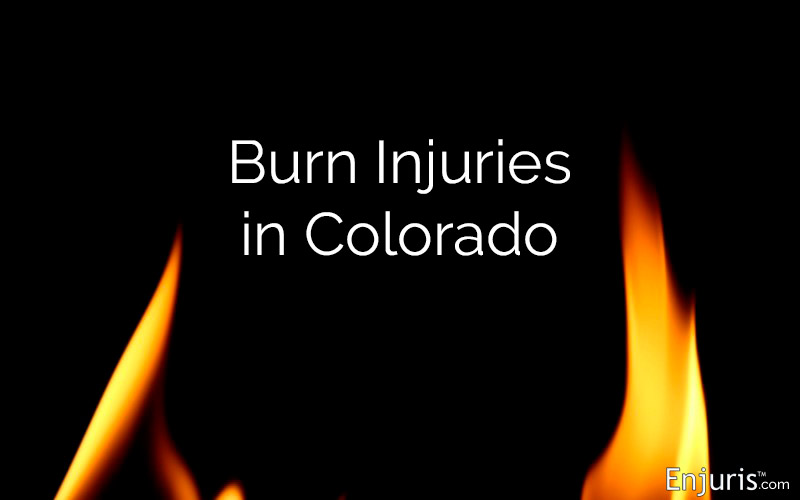What legal options do you have if you're burned in an accident?
What’s the largest organ in your body? Your skin. It might seem like a trick question (and then there’s that joke kids say once they learn a few anatomy terms – “Hey, cover up! Your epidermis is showing!”), but our skin is the envelope holding in all of our vital, fragile organs. Serious burns can range from mild to agonizing, and even leave you dead.
If the burn was caused by someone’s carelessness, you might have the opportunity to sue for negligence, or (if the worst happened) your estate can sue for wrongful death.
The pain and suffering of burns is not something juries take lightly, and legal settlements resulting from them can be substantial. If you are suffering from severe pain and have significant medical bills, this should be an option you consider. However, Colorado has various legal quirks that we must discuss.
It can be difficult to determine how much a burn injury settlement might be beforehand. Factors that can affect the verdict could be:
- How severe your injury is (these typically fall under “catastrophic injuries”)
- The extent to which the responsible party can pay damages
- Damage caps
- The intent of the party who caused the burns
Since the pain and suffering surrounding burn victims is generally much higher than that of other victims, higher settlements are usually the result. However, it can be a long road to get there.
Elements of a burn injury lawsuit in Colorado
Like all negligence cases, you – the victim, AKA the plaintiff – have the burden of proof. This means you have to establish that you were injured, and most importantly, that you were injured by the defendant. To do this under Colorado law, you have to show the following:
- The defendant owed you a duty of care. For instance, say you were at work and the defendant was your employer. This means that your boss had a duty to keep your workplace in reasonably safe order, and that you shouldn’t be getting burned while performing your normal duties.
- The defendant breached that duty of care. In our example, let’s say that your boss acted with reckless disregard by neglecting to label a bottle that contained an unnamed chemical cleaning agent.
- That breach of duty directly led to your injuries, and that breach caused damages. You were harmed when you tried to use the contents of the bottle to wash your hands; your skin became badly burned by the chemical agent and you accrued significant medical bills in treating the chemical burn.
How and where the burn happened
At the risk of sounding insensitive, how and where a burn occurred will most certainly affect a plaintiff’s potential settlement. Was it the victim’s face that was disfigured, or was it his arm? Will he never feel comfortable taking off his shirt again? Or was it something that can be easily hidden?
Additionally, the jury will look at the physical location of where the burn occurred and whether it was foreseeable. The following are places where burns might happen:
- Car accidents (with or without drunk driving)
- Defective industrial equipment and products
- Flammable materials
- Structural fires
- Defective household products
- Gas explosions
- Workplace accidents
- Faulty wiring
Burn cases also have inner complexities that will affect potential rewards, such as whether it took place at work – if it were potentially avoidable, a jury may not feel a reward is judicious, even if there are significant medical bills. However, if it were because of an employer’s failure to follow OSHA regulations, then the value might go up again. It’s all a gamble.
Possible compensation in a Colorado burn injury case
If you can establish that you have been burned because of an individual’s or company’s negligence, then Colorado law will allow you to be compensated for:
- Wages that you have lost, as well as wages you might lose in the future because of your injuries
- Medical bills (both future and past) related to your burn injuries
- Expenses related to burn injuries that were paid out of pocket
- Pain and suffering
There are damage caps in Colorado. For pain and suffering, the amount is $250,000 plus inflation, unless there is clear and convincing evidence for an exception or permanent damage. There is a total cap at $500,000.
Of course, like with everything else, there may be certain exceptions.
Wrongful death after a burn injury
There is also the option of filing a wrongful death suit if a loved one has passed away because of a burn injury.
In Colorado, the Wrongful Death Act, Statute Section 13-21-202 states that the decedent’s surviving spouse is the only one who can bring a claim during the first year following the date of death. During the second year, both the surviving spouse and any surviving children can bring a claim. If the decedent left no surviving spouse or children, then the surviving parents are allowed to file an action.
The statute of limitations for a wrongful death suit is two years from the date of death, though this can be “tolled,” or postponed, under certain circumstances.
As wrongful death claims are brought in civil court, they are resolved solely through monetary means. Unfortunately, non-economic damages also have caps. Damages include, but are not limited to:
- Loss of the decedent’s income and services
- Funeral and medical expenses
- Pain and suffering (capped at $250,000, though again, burns would probably be an exception because of their catastrophic nature)
- Emotional loss and the loss of companionship (capped at $250,000)
Colorado does allow for punitive damages if the defendant’s actions were considered to be willful or reckless.
The other important consideration in a wrongful death claim is whether the defendant has an insurance policy or access to money. If not, there might be no way to make them pay for what they did. This would be a question for an attorney.
Talking to a lawyer
If you need some assistance through this difficult process, read some of the resources below and speak with some of Enjuris’ Colorado attorneys, who are well versed in this area. They will be able to help you.
Resources to help you hire the best Colorado personal injury lawyer
- Choosing a personal injury attorney – interview questions
- How damages are calculated
- When do you NOT need an attorney after an accident?
- Preparing to meet with a personal injury attorney
- How to talk to a lawyer
- Negotiating lawyers’ fees - how do accident lawyers charge? Are there any hidden costs?
See our guide Choosing a personal injury attorney.


